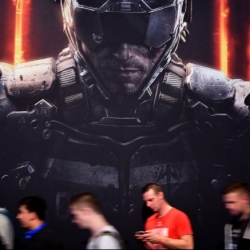
Around the time Massachusetts officials began their study, CNN asked the question, “Is eSports Professional Gaming a Sport?”
The Massachusetts Special Commission on Online Gaming, Fantasy Sports Gaming and Daily Fantasy Sports has been reviewing eSports regulation over the past 11 months. Last February, the commission said its studies had shown that electronic sports was “really one of the biggest things coming“.
Despite that recognition, the Massachusetts Special Commission appears to have a distorted view of the eSports gaming community. Last year, the commission called for testimony from Justin Stempeck, a staff attorney for the Massachusetts Gaming Commission.
Unfortunately, if the commission members took Stempeck’s opinions to heart, they came away with a wrong-headed impression of eSports enthusiasts.
Justin Stempeck on Esports
At the time, Stempeck said to the commission, “This is not 20 guys in a basement playing these games. This is every teenager who has a video game system. And it’s so popular, of course there’s money in it. So there’s the legit people playing as a competitor, they’re playing in a contest and playing for money, and then there’s people who are betting on those people.”
Of course, Justin Stempeck was correct that eSports is not “20 guys in a basement”. His fallacy is the emphasis on “every teenager who has a video game system“.
Mindshare, a New York City based global media and marketing services company, released data which shows eSports is lucrative because of the 25-to-39 male demographic.
Mindshare Statistics on Esports
The Mindshare report showed that 60% of eSports fans are in the 25-to-39 age demographic. Mindshare also reported that 43% of those people have a household income over $75,000. The mainstream eSports fans who fuel the revenue generation are established in the workforce and many have successful careers.
Justin Stempeck’s fallacy might have been from assumption and not fact, but his testimony gave special emphasis to enacting regulations. Stempeck said in his same testimony, “There’s a whole gray and black market of people betting on people playing video games for money.”
If teenagers are driving eSports revenues, the reasoning goes, then the Massachusetts government needs to involve itself in regulation. If a regulated gaming environement existed, then the gray market and black market eSports business in Massachusetts would dry up and go away.
The Benefits of Regulated eSports
Mindshare’s statistics paint a different picture, though it still begs for regulated gaming. A regulated eSports gaming market would allow Massachusetts to license and tax the gaming activities, while enforcing policies to help problem gamblers. Those policies would include compulsive gambling controls on regulated websites, a self-exclusion list, and direct access to helplines and other problem gambling resources. A black market or gray market has none of those things.
The regulation of eSports might allow companies like Seattle-based Unikrn to operate legally in the state. Gambling on eSports would be the same as sports betting, so the 1961 Wire Act, the 1992 PASPA, and the 2006 UIGEA laws likely would keep electronic sports betting banned for the time being. Many believe sports betting bans are going to be reversed in the next few years, so eSports betting might be legal within a short time span.
Sen. Eileen Donoghue
An aide for State Senator Eileen Donoghue, chairperson for the Massachusetts Joint Committee on Economic Development, said that eSports is likely to be on the agenda at the next committee meeting on February 28. Earlier, Sen. Donoghua said of eSports regulation, “I think the trick will be to come up with a framework that is appropriate and nimble enough to deal with innovation and technology that changes on the fly.”
One thing Justin Stempeck had right is the fact eSports is a substantial industry with a growing following. Stempeck said in a committee hearing, “This is here, this is happening, It’s just nobody is really shining the lights on it yet. You want to talk about DFS and popularity, here is something else that is hugely popular with young people and hasn’t gotten nearly the level of scrutiny DFS has.”
Esports betting is a reality, just like daily fantasy sports, so its implications should be considered.
What Is eSports?
Esports is “electronic sports”, better know as video game and computer game playing. When someone calls it electronic sports, they usually mean video gaming in an organized, competitive environment. Esports tournaments take place with real prize money on the line and a live audience to watch the gaming.
In fact, eSports is popular enough that people go online to watch eSports tournaments via live streaming on Twitch. Esports programming exists which treats those events like they are sporting events. They have studio broadcasters, play-by-play and color analysts, and interviews with competitors, who sometimes gain fame for their exploits.
